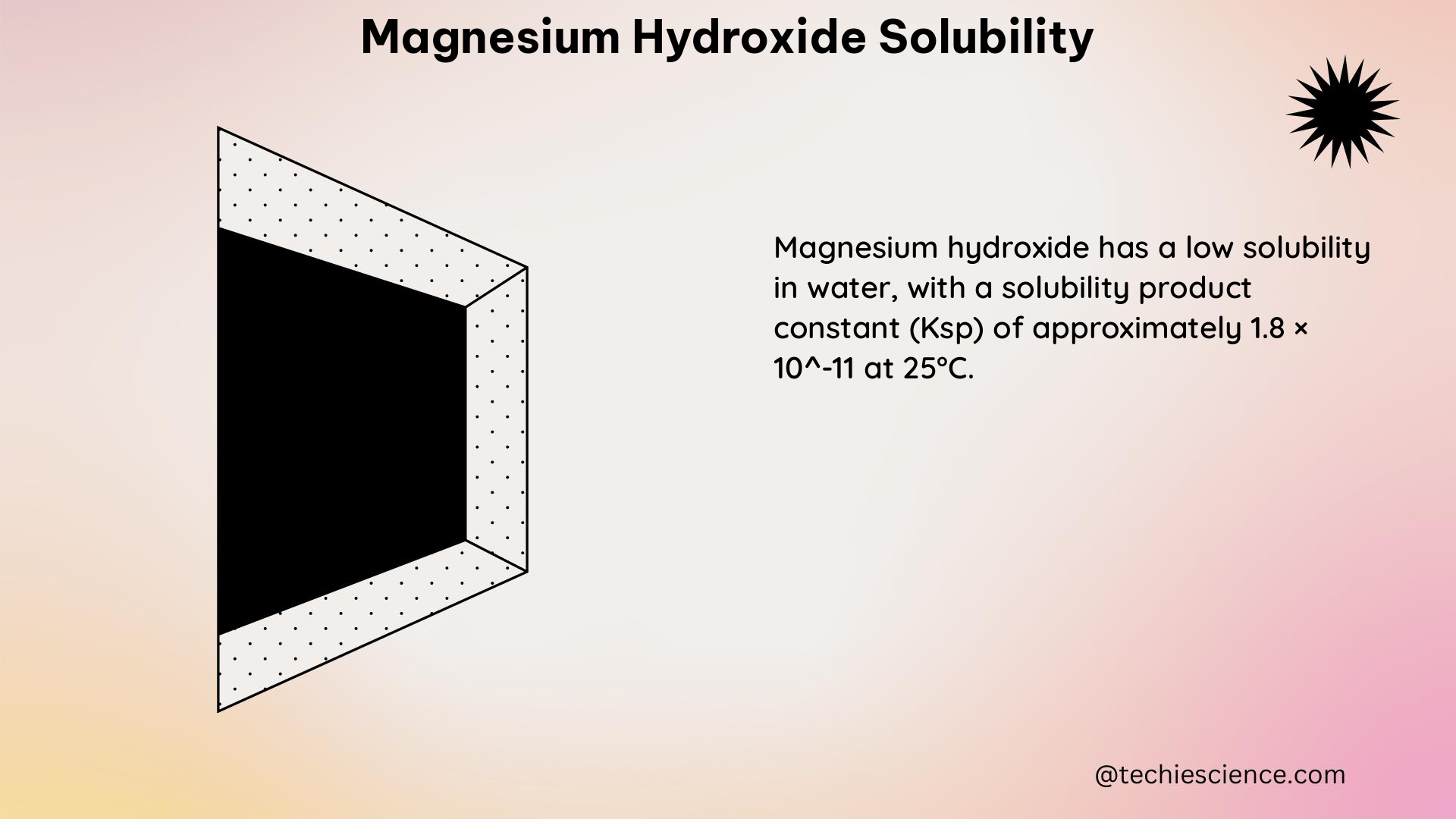Magnesium hydroxide, Mg(OH)2, is a sparingly soluble compound with a solubility of 1.6 x 10^-4 mol/L at 298 K (25°C). This means that at a temperature of 25°C, 1.6 x 10^-4 moles of magnesium hydroxide can be dissolved in one liter of water before the solution becomes saturated. Understanding the solubility of magnesium hydroxide is crucial in various applications, from water treatment to pharmaceutical formulations.
Solubility Product Constant (Ksp) of Magnesium Hydroxide
The solubility product constant (Ksp) of magnesium hydroxide is a measure of its solubility in water. Magnesium hydroxide has a Ksp of 6 x 10^-10, indicating that the concentration of magnesium ions (Mg^2+) and hydroxide ions (OH-) in a saturated solution is very low.
The Ksp of magnesium hydroxide can be expressed as:
Ksp = [Mg^2+] x [OH-]^2
Where [Mg^2+] and [OH-] represent the molar concentrations of magnesium ions and hydroxide ions, respectively, in the saturated solution.
Factors Affecting Magnesium Hydroxide Solubility

The solubility of magnesium hydroxide can be influenced by various factors, including temperature, pH, and the presence of other ions in the solution.
Temperature
The solubility of magnesium hydroxide generally increases with increasing temperature. This is due to the endothermic nature of the dissolution process, as described by the following equation:
Mg(OH)2 (s) ⇌ Mg^2+ (aq) + 2 OH- (aq)
The forward reaction is favored at higher temperatures, leading to an increase in the solubility of magnesium hydroxide.
pH
The pH of the solution also affects the solubility of magnesium hydroxide. Magnesium hydroxide is a weak base, and its solubility is influenced by the concentration of hydrogen ions (H+) in the solution.
In a basic solution (pH > 7), the solubility of magnesium hydroxide is relatively low, as the concentration of hydroxide ions (OH-) is high, and the equilibrium is shifted towards the formation of the solid Mg(OH)2.
In an acidic solution (pH < 7), the solubility of magnesium hydroxide increases, as the hydrogen ions (H+) react with the hydroxide ions (OH-) to form water, shifting the equilibrium towards the dissolution of the solid.
Presence of Other Ions
The presence of other ions in the solution can also affect the solubility of magnesium hydroxide. For example, the addition of chloride ions (Cl-) can increase the solubility of magnesium hydroxide by forming soluble magnesium chloride complexes.
Conversely, the presence of sulfate ions (SO4^2-) can decrease the solubility of magnesium hydroxide by forming insoluble magnesium sulfate (MgSO4) precipitates.
Comparison with Calcium Sulfate Solubility
The solubility of magnesium hydroxide can be compared to that of calcium sulfate (CaSO4), another sparingly soluble compound.
Calcium sulfate has a solubility product (Ksp) of around 2.5 x 10^-5, which is significantly higher than the Ksp of magnesium hydroxide (6 x 10^-10). This means that calcium sulfate is more soluble in water than magnesium hydroxide, and is more likely to precipitate out of solution.
Reactions of Magnesium Hydroxide with Acids
When acid is added to a solution of magnesium hydroxide, it immediately reacts with the dissolved hydroxide ions, causing the pH of the solution to decrease. Any undissolved magnesium hydroxide slowly reacts with the added acid, resulting in the formation of dissolved magnesium ions and water.
The reaction can be represented by the following equation:
Mg(OH)2 (s) + 2 H+ (aq) → Mg^2+ (aq) + 2 H2O (l)
At the equivalence point of the reaction, when just enough acid has been added to completely react with all of the solid magnesium hydroxide, the solution becomes transparent, and all of the solid has been converted to dissolved products.
Practical Considerations for DIY Applications
In terms of DIY applications, the low solubility of magnesium hydroxide in water can have practical implications. When added to a solution, magnesium hydroxide may not dissolve completely, resulting in a milky-white appearance and a basic pH.
This can affect the outcome of certain experiments or reactions, as the undissolved magnesium hydroxide can interact with other components in the solution. It is important to consider the solubility of magnesium hydroxide and its potential impact when using it in DIY projects or experiments.
Conclusion
Magnesium hydroxide, Mg(OH)2, is a sparingly soluble compound with a solubility of 1.6 x 10^-4 mol/L at 25°C. Its solubility is influenced by factors such as temperature, pH, and the presence of other ions in the solution. Understanding the solubility of magnesium hydroxide is crucial in various applications, from water treatment to pharmaceutical formulations. By considering the factors that affect its solubility, researchers and DIY enthusiasts can better predict and control the behavior of magnesium hydroxide in their experiments and projects.
References
- Magnesium Hydroxide Solubility and Ksp: https://www.ncbi.nlm.nih.gov/books/NBK225636/
- Magnesium Hydroxide Solubility and pH: https://www.coursesidekick.com/chemistry/1228273
- Solubility of Mg(OH)2 and Ksp Calculation: https://socratic.org/questions/solubility-of-mg-oh-2-is-1-6-x-10-4-mol-l-at-298-k-what-is-its-solubility-produc
- Magnesium Hydroxide Solubility and Reactions: https://www.ncbi.nlm.nih.gov/pmc/articles/PMC7662945/

The lambdageeks.com Core SME Team is a group of experienced subject matter experts from diverse scientific and technical fields including Physics, Chemistry, Technology,Electronics & Electrical Engineering, Automotive, Mechanical Engineering. Our team collaborates to create high-quality, well-researched articles on a wide range of science and technology topics for the lambdageeks.com website.
All Our Senior SME are having more than 7 Years of experience in the respective fields . They are either Working Industry Professionals or assocaited With different Universities. Refer Our Authors Page to get to know About our Core SMEs.